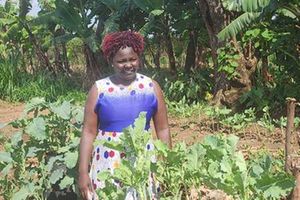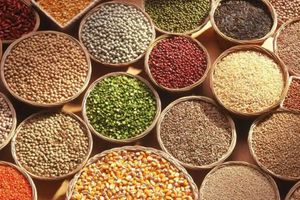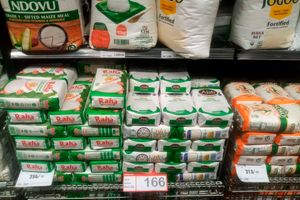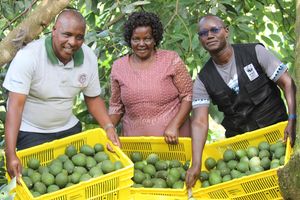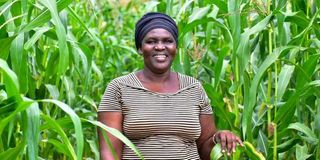
Irene Obuko at her farm on May 19, 2025.
In Ndere Village, Siaya County, Irene Obuko stands in the middle of her maize plantation, admiring the uniform green rows that stretch across her two-acre plot.
This season, she planted the DH04 maize variety for the first time. The seedlings were given by the county government.
“I can already tell the difference. The maize is taller, healthier, greener, and growing faster than what I’ve been used to,” she says.
For Ms Obuko, who has been a farmer for over 25 years, the support could not have come at a better time. “Last year, I used indigenous seeds given by a friend. I paid Sh150 per kilo of the seed and had to use over six kilos per acre, but the yield was low, just about five bags per acre,” she explains.

Irene Obuko at her farm on May 19, 2025.
According to the farmer, gapping was a mandatory practice since most of the seeds would fail to germinate as a result of the harsh ecological conditions.
“I didn’t want to lose the indigenous seeds but it came with repercussions. The output was dismal as opposed to the input,” she asserts.
This season, the farmer decided to abandon her lifelong indigenous seeds and tried the hybrid ones. Through the ‘Long Rains Programme’, the 45-year-old farmer received the DH04 hybrid maize seed at a subsidised cost – Sh180 for a 2kg pack, enough for half an acre.
“I only needed 4 kilos for an acre. That is less than Sh400 per bag of seeds. I am expecting my yield to go up to 18 or even 20 bags per acre.”
"The extension officers recommended DH04 because it is specifically bred for drought tolerance, making it ideal for arid and semi-arid areas like Siaya County. It is also an early to medium maturing hybrid, reaching green maturity in about 75-85 days or full maturity within 80-120 days," she explains.
The savings Ms Obuko made did not stop at seeds. Previously, she relied on hired oxen to plough her land, paying up to Sh3,000 per acre and often waiting for days due to high demand. This season, she registered with the ward agricultural office for tractor services.
“I paid Sh1,500 to plough an acre with a tractor. It was faster and cheaper. I was done in one morning,” she adds.
She also bought two bags of subsidised fertiliser at Sh2,500, compared to the market rate of Sh5,000.
“Since I planted on time with tractor support, weeding was easier. I only hired two people, not four as I did in the past, which helped me save some money.”
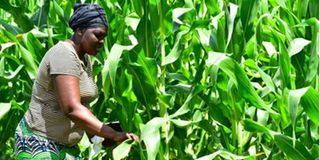
Irene Obuko at her farm on May 19, 2025.
She estimates that her total operational costs per acre have dropped from around Sh13,500 to under Sh7,000. While she barely harvested enough produce to support her family last year, she hopes to harvest enough for her family and sell the surplus this year.
“I planted early, used better seed and fertiliser, and followed the advice from extension officers. If I get 15 bags from just one acre, that’s already three times better than before. I’m hopeful,” she says.
Ms Obuko is one of many farmers in Siaya County who are hopeful of a bumper maize harvest this season, thanks to this new high-yield maize variety introduced by the county government under the “Long Rains” campaign.
The programme, which provides subsidised seeds, fertiliser and mechanised ploughing services, is gradually transforming farming experiences across the county. The Department of Agriculture, Food Security, Livestock, and Blue Economy says that this is the kind of transformation it hoped to achieve.
Chief Officer Elizabeth Adongo says the county is targeting over 15,000 farmers with certified seeds and fertiliser subsidies this season.
Accessible and profitable
“We are making farming more accessible and profitable. The goal is food security and income generation, especially for smallholder farmers,” she said, pointing out that indigenous seeds are no longer viable for local farming.
"Farmers in Siaya invest heavily in inputs but consistently experience low yields, which is not sustainable. Our primary goal is to promote sustainable agriculture. We have been training farmers on the importance of adopting certified seeds that are better suited to the ecological conditions of Siaya County," she said.
The county has also deployed extension officers to support farmers in each ward, and over 200 youth agripreneurs are helping with outreach under a new agricultural value chain support project.
County Executive Member for Agriculture, Kokoth Sylvester, says the Long Rains campaign is more than a seasonal effort. “We are helping farmers shift from trial-and-error farming to planned, evidence-based agriculture. It’s a new era.”
He said that the county has also developed a Youth in Agribusiness Strategy aimed at encouraging greater youth participation in agriculture. "Siaya County comprises 30 per cent blue economy space. We have crafted the Youth in Agribusiness Strategy, the main goal to inspire our young people and those trained in agricultural production.”

